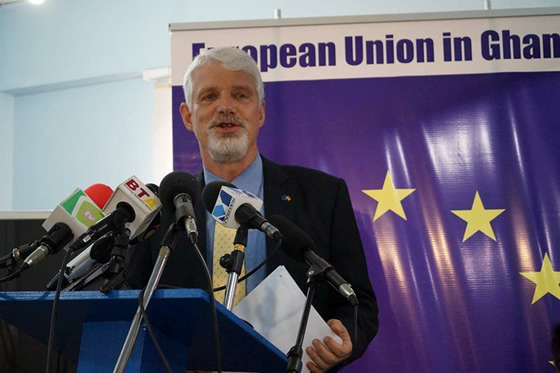
William Hanna, Head of EU Delegation
It is time to limit unequal and unfair competition between industrial fishing fleets and artisanal fisheries in order to protect the artisanal fishing industry, Mr William Hanna, the European Union (EU) Ambassador to Ghana, has said.
“We need to protect artisanal fisheries. This is what this project is about. It will only succeed if all stakeholders play their part,” Mr Hanna said at the national launch of the Far Ban Bo, a Fante name (to wit protecting fisheries livelihoods) Project in Accra.
“Far Ban Bo – Protecting Fisheries Livelihoods” is a four-year project in Ghana, funded by the EU and being implemented by a consortium consisting of CARE (the Lead), Friends of the Nation (FoN) and Oxfam.
The overall objective of the project is to contribute to sustainable fisheries resource management to improve food security, nutrition and livelihoods of smallholder fishers and other users of fishery resources.
The Project implementing partners, led by CARE, had already organised four pre zonal launches in Takoradi, Cape Coast, Keta and Kpando to introduce the project to key stakeholders in the respective locations.
Mr Hanna said the main focus of the project was on the vulnerable, disenfranchised fishermen and women who are considered to be most at risk from impacts of Illegal Unreported (IUU) Fishing.
He said the EU was funding the project because they were concerned about illegal, unreported and unregulated fishing.
Mr Hanna said in line with the United Nations Sustainable Development Goals (SDGs), the EU and its member states would support sustainable management, use of natural resources, and the conversation and sustainable use of biodiversity and ecosystem including forests, oceans, coastal areas and river basins.
“The consensus commits us to enhance the integration of sustainability in all cooperation sectors and to raise the profile of environment issues with partners,” he said.
“We commit to promote the protection and restoration of marine ecosystems, achieve healthy and productive oceans and sustainable management of ocean resources and sustainable fisheries through improved ocean governance and the development of the blue economy,” he added.
He said: “So, at the highest level in Europe and in Ghana, as partners in development, our leaders are today emphasizing sustainability and showing new commitment to fighting against practices which are unsustainable.”
Mr Hanna said illegal, unreported and unregulated fishing was such an unsustainable practice; adding; “It’s a free for all, in which the powerful grab the resources, the powerless suffer, and in the end – if it goes on this way – there will be no fish left for anyone”.
He urged the Government to ensure that no foreign trawlers flying Ghanaian flags flout the law.
“They must not be allowed to fish illegally in foreign waters, fish without licenses; engage in transhipment, light fishing, use of undersized mesh, dumping of fish at sea and use of explosives and poison. All these are illegal activities,” he said.
He urged all the partners of this project to work closely together to achieve the results of the project to enhance the lives of the coastal fisher folks and protect fisheries resources for future generations.
Ms Aforley Quaye, the Minister of Fisheries, said the Government would continue to empower the fishers to enforce the fisheries regulation because in spite of the works of the Fisheries Enforcement Unit, illegal fishing practices were prevalent, especially at the marine coastal fishing landing sites.
“I also request that when fishers make an arrest for infraction of the fisheries law and regulations all should play their various roles as mandated by law to ensure that the arrested fishermen were prosecuted,” she said.
Mr Elkanah Odembo, the Country Director CARE International, said the project had been designed to work with stakeholders towards ensuring that smallholder (artisanal) fishers and other users of fisheries resources benefited from equitable and sustainable fisheries resources management in Ghana.
Nana Kwesi Agyemeng IX, the Paramount Chief of Lower Dixcove Traditional Area, called on all and sundry to support the project because it would bring a lot of benefits to the fishing industry in the country.
Source: GNA























